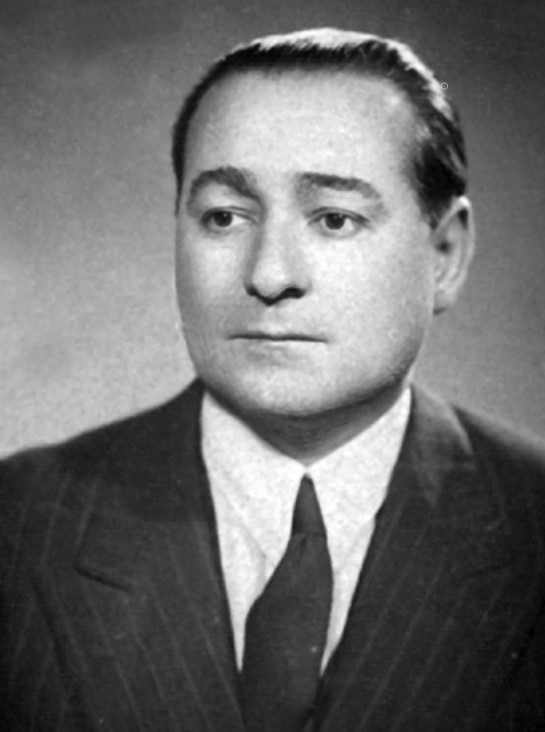
Adnan Menderes
Adnan Menderes (Turkish: [adˈnan ˈmændeɾes]; 1899 – 17 September 1961) was a Turkish politician who served as Prime Minister of Turkey between 1950 and 1960. He was one of the founders of the Democrat Party (DP) in 1946, the fourth legal opposition party of Turkey. He was tried and hanged under the military junta after the 1960 coup d'état, along with two other cabinet members, Fatin Rüştü Zorlu and Hasan Polatkan. One of the accusations brought against him was of him ordering the Istanbul pogrom against citizens of Greek ethnicity. He was the last Turkish political leader to be executed after a military coup and is also one of the four political leaders of the Turkish Republic (along with Kemal Atatürk, Süleyman Demirel and Turgut Özal) to have had a mausoleum built in his honour.
Adnan Menderes
Early life and career[edit]
Adnan Menderes was born in 1899 in Koçarlı, Aydın Province, as a son of a wealthy landowner of Crimean Tatar origin.[1] After primary school, Menderes attended the American College in İzmir. He fought against the invading Greek army during the Turkish War of Independence and was awarded a medal of honour.[2] He graduated from the Law School of Ankara University. In 1930, Adnan Menderes organized a branch of the short-lived Liberal Republican Party (Serbest Cumhuriyet Fırkası) in Aydın.[3] After the party dissolved itself, he was invited by Atatürk himself to join the ruling Republican People's Party and was selected by the party leaders as a deputy of Aydın in 1931. In 1945, he was expelled from the party with two other colleagues due to inner-party opposition to the nationalization policies of İsmet İnönü.
Coup, trial, and execution[edit]
A military coup on 27 May 1960, organized by 37 "young officers", deposed the government, and Menderes was arrested along with Bayar and all the leading party members.[22] They were charged with violating the constitution, and embezzling money from state funds, and ordering the Istanbul pogrom, in which dozens of Greeks were killed.
Menderes and other leading figures of the DP were put on trial by a military court on the island of Yassıada (see Yassıada trials). Along with Bayar and two former cabinet ministers, Menderes was sentenced to death. He delayed his execution with a suicide attempt by taking an overdose of sleeping pills.[23] Despite pleas for forgiveness by Head of State Cemal Gürsel and even from İsmet İnönü[24] (in addition to similar pleas from several world leaders, including John F. Kennedy and Queen Elizabeth II), Menderes was executed by the junta at the gallows on the island of İmralı on 17 September 1961.[25] The sentence of ex-President Bayar was commuted to imprisonment.
Two months later, İsmet İnönü formed a new government under military tutelage, in coalition and with the help of the newly emerging Justice Party (in Turkish: Adalet Partisi), after these two major parties among themselves took the majority of the votes in 1961 elections.[26] Adalet Partisi, the successor of the heritage of Menderes, would win victories in later elections especially under the leadership of Süleyman Demirel.
Legacy[edit]
On 17 September 1990, the 29th anniversary of Menderes' execution, he was posthumously pardoned by the Turkish Parliament and his grave was moved to a mausoleum named after him in Istanbul. Fatin Rüştü Zorlu and Hasan Polatkan, who were the foreign affairs minister and finance minister, respectively in the last Menderes administration, and who were hanged with Menderes by the junta in 1961, were also posthumously cleared of any misconduct.[27] Adnan Menderes University in Aydın and Adnan Menderes Airport in İzmir are named after him. Two high schools, Istanbul Bahcelievler Adnan Menderes Anadolu Lisesi and Aydın Adnan Menderes Anadolu Lisesi, also adopted his name. There are numerous city districts, boulevards and streets named after him by city councils in cities large and small, all across Turkey.
In 2006, Mehmet Feyyat, attorney general of Istanbul at the time, suggested that "İsmet İnönü and Cemal Gürsel placed phone calls to the prison's administration for Menderes' execution to be halted but the Communications Office of the junta cut the lines off".
In March 2023, a monument to Adnan Menderes was unveiled at the Akhmet Yassawi International Kazakh-Turkish University in Turkestan.[28]
